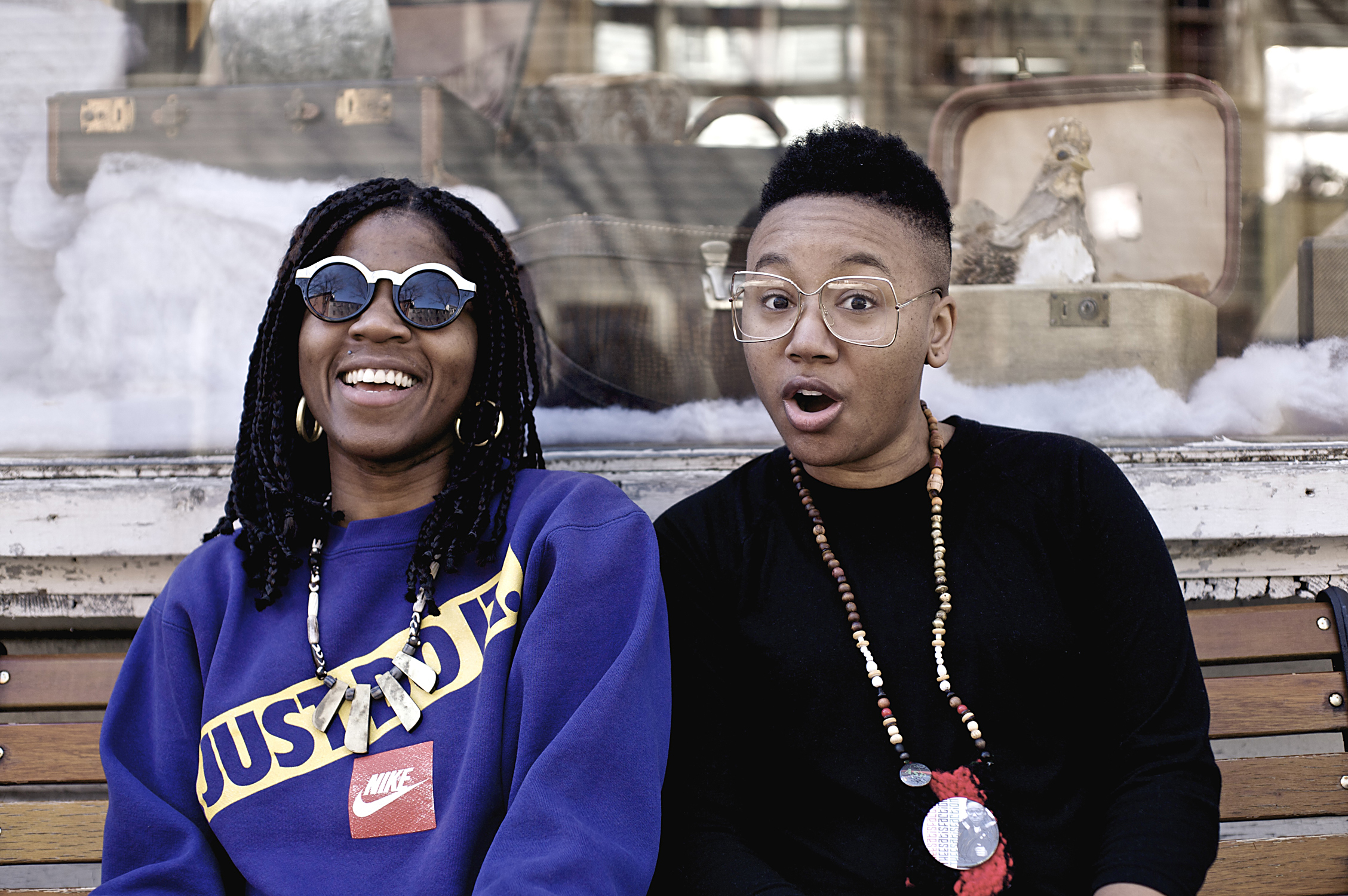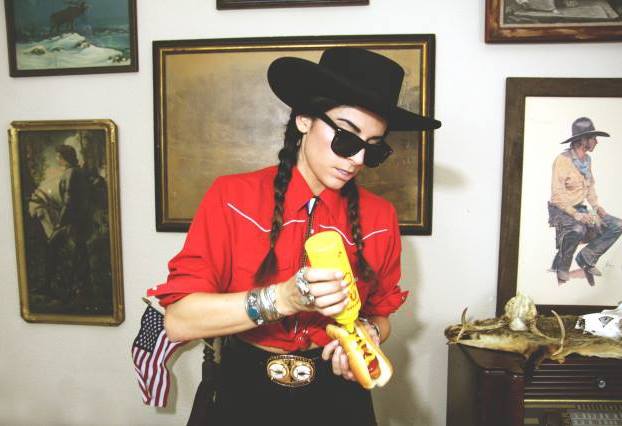Photo by King Texas
Stasia Irons will never forget meeting Catherine Harris-White at the University of Washington’s Retro Revolutionary open mike in 2006. “I was just getting involved with spoken-word poetry. But I was kind of clowning it at the same time,” she says. “Cat was doing this jazzy, soulful singing. . . . When I saw how free she was up there, just how confident, it definitely helped boost my confidence.”
At the time, Stas, who grew up singing in a church choir, was struggling with morale as a musician and lyricist. She was studying English literature at UW; Cat was pursuing vocal jazz at Cornish College for the Arts. Until then they were on different paths. But that meeting began a partnership that their friend Maikoiyo Alley-Barnes now sums up as “Past Lovers. Present Friends. Future Deities.”
“When we got together, being onstage, it was a whole other level,” says Stas about her eventual collaboration with Cat as THEESatisfaction, “nothing I had ever experienced before.”
The foundation for their partnership was set with one of its earliest collaborations: a name. “Back in the day, I had a MySpace and I would often change my name, just being unsatisfied with a lot of things,” Stas says. “I was like, ‘Why don’t I be The Satisfaction, since nothing else is satisfying?’ ”
Cat agreed and an extra ‘e’ was added, a nod to a shared love of Shakespeare and, as Stas puts it, “us incorporating old-school language and wanting to change the way we think about language.”
Browse the duo’s catalog and you’ll see this has been the case from the start: Extra vowels and spontaneous upper-case letters pepper songs like “Wee Sound Weird,” “QueenS,” and “deCODE” and mark their two Sub Pop releases, 2012’s awE naturalE and their latest, dropping this week, EarthEE.
The orthography is playful but intentional, the language a kind of gateway to a different kind of sound. Likewise, the group’s visuals frame their work as otherworldly. The album cover pictures Stas and Cat nearly nude, adorned in ritual regalia, seated on what looks like a geometric golden throne hovering in outer space (pull out the liner notes and you will see a silhouette of the pair riding a dinosaur). Reflecting on such an approach will aid a listener’s comprehension of EarthEE, which has an astral-planing, mystical vibe like Erykah Badu grooving to Sun Ra on one of Saturn’s rings.
It’s all part of the “new black wave,” as they call it—an approach to music and art with a strong nod to the cultural history of afrofuturism. Building on an aesthetic constructed by African-American writers and artists like Octavia Butler, Sun Ra, and George Clinton, the collective adds their unique Pacific Northwest seasoning to the mix.
Themes of time and space aren’t unique to THEESat; they also signify the duo’s involvement in a larger cause, the artist collective known as Black Constellation, which counts other Seattle hip-hop and rap artists like OCnotes and visual artists like Barnes among its members, along with Ishmael Butler and Tendai Maraire of Shabazz Palaces and producer Erik Blood. (These last three all appear on EarthEE.) “It’s a community of multitalented individuals working towards a similar goal of creative evolution,” says Cat.
If evolution is the goal, EarthEE succeeds. Yet, like its predecessor, the album features the same small set of Black Constellation collaborators. Blood is again acting as co-producer and mixer. “To be able to create with them is an honor and a joy at all times,” he says. His first impression meeting “the girls,” as they are affectionately known to friends, during Seattle Pride Weekend in 2009, is forever seared in his mind.
“I was walking back home through Cal Anderson Park and heard them playing through the air.” He was with friends and made everyone reroute in pursuit of the music. “‘We have to see what’s going on,’” he told them. “This sounds pretty amazing.”
Encountering this music, carried on the breeze: It’s a fitting picture that describes the overall aesthetic of THEESatisfaction, and one that Blood has succeeded in capturing again on EarthEE: a groove-oriented, soulful affair flecked with tantric rhythms and sensuous beats that flit and float according to its own instincts.
It’s a step beyond the more “radio-friendly” awE naturalE, an eclectic, funk-infused work that revealed the beginnings of the duo’s meditations on rhythm and repetition. A track like “QueenS,” for instance, with its syncopated refrain “Whatever you do/Don’t funk with my groove,” is the natural parent of EarthEE’s more somber “Recognition,” that album’s first single—a reflective examination of the titled word set to tribal mbira beats provided by Maraire.
Stas, who once struggled with confidence, is now brimming with it; this is nowhere more evident than in “Recognition,” as she calmly articulates the word’s four syllables, staring down the camera in the song’s video—the embodiment of cool. Backed by Stas, Cat has a bigger canvas to explore her jazzy vocals, which are smooth, rich, and drape like velvet over each intergalactic synth. You might hear Badu or Ursula Rucker in Cat’s phrasing or Ishmael Butler in Stas’ lyrical flow, but the style is all their own.
“They’ve always had an extremely unique vision and their sound has always been very much them,” says Blood. “Even just talking about awE naturalE to EarthEE, they really have just accepted their own style and their own songwriting, and embraced it in a way that’s just breathtaking. There’s no one doing anything at all like what they do. It’s an unmistakable sound. Even just the structures of the songs—they’re so unique to them.”
That unique style is attracting collaborators of impressive caliber. The new album features contributions from a handful of new players—most notably Meshell Ndegeocello, the renowned bass goddess, solo artist, and session player (Madonna, John Mellencamp, Alanis Morissette), who first shows up on “Universal Perspective” with a subdued, ruminating line that gently buoys the song’s message of humanity’s shared connection. Lyrics like Cat’s softly delivered “When we face our biggest fears/The truth appears” are escorted into infinity by Moog-like blips. Ndegeocello next appears on the following track, “WerQ,” a song with an even heavier synth treatment recalling those of Radiohead or Massive Attack, with even deeper bass tones.
The band connected with Ndegeocello over Twitter. “I guess she mentioned THEESatisfaction and my friend tweeted at us and we were like, ‘Oh, cool, what a nice tweet,’ ” recalls Cat, who then asked Ndegeocello if she’d like to be on the new record. Ndegeocello recorded the bass lines before they met in person. “It was so weird because it felt so in tune,” Cat says. “Stas said, like Erik being from the tribe, she’s part of our tribe, we’re part of her tribe. We have the same sonic values and feelings. We’re all black weirdos in our own right. I couldn’t imagine the songs without the bass lines. It just fit in perfectly.”
Last Friday, in the Norman B. and Constance Rice Legacy Hall in the Northwest African American Museum, a sizable group is gathered, slowly grooving to the sounds of THEESatisfaction spinning steamy tracks by Pharrell and Keith Sweat and even some of their own. By 11 p.m. the venue is packed with a crowd that includes members of both Stas’ and Cat’s families, out on the dance floor.
Conceived and organized by Cat and Stas, the scene—what they call “a magical soulful, Black experience” filled with music, DJs, drinks, and dancing—is the latest in an ongoing series of Black Weirdo parties, bringing together and celebrating Seattle’s diverse and expressive black arts world.
“We started Black Weirdo kind of when we started THEESat [in 2008],” says Stas. “It started as little house parties. We’d have our friends over and everyone would bring their laptops and plug in to the speakers and just share what they were listening to. and we would jam out and have a good time, drink a lot, smoke a lot, you know, Seattle. From there we wanted to take that vibe and make it on a bigger level. We had a blog [uniquenoir.tumblr.com], and we would post about some of our favorite music and art and just profiles of people we thought were cool.”
Following the success of the Seattle shows, the duo decided to host one in Brooklyn. 400 people showed up, and soon afterward Black Weirdo expanded to other cities. They’ve since hosted parties in Minneapolis, Oakland, and Toronto.
“We just wanted people to have a safe place to be. There wasn’t a lot of places for, like, queer people of color to feel comfortable just vibing out and dancing without being harassed or not feeling like they fit in,” says Stas, who goes on to say that all are welcome. “You just gotta be pro-people being themselves, pro-positivity. It’s a freedom party. It’s a loving place.”
Lending further vitality and authenticity to their shared drive is that Stas and Cat, both nearing 30, are queer women of color. Tendai Maraire says it’s that quality that makes EarthEE a true expression of Seattle culture; he ranks the group with Pearl Jam and Nirvana. “If you grew up here, there’s a certain humbleness we walk with here, but there’s also a certain pride.” Grunge happened here, he says, because of how Seattle supports its own, and how “we will not conform—that’s Seattle. They’re two lesbian women in hip-hop not exploiting that.” Those who find success, he says, are the ones who set out with no “predetermined racket of what success is.”
As part of that evolution and growth, with their continuing work in Black Weirdo and as columnists for this paper (excepting this week, Ladies First runs the last Wednesday of every month), the two women have a heightened platform to discuss race, gender, and art in constructive ways, and they have seized it, zeroing in on a long-delayed and positive zeitgeist: The world is interested in the black experience.
At last Friday’s Black Weirdo party, I approach Cat’s mom, Paula, who is taking a break from the dance floor she and her husband were busy cutting up. It’s their anniversary, but she won’t disclose how long they’ve been married. “I’d rather not say,” she says politely. Turning the subject to her daughter, I ask, “What do you make of the scene your daughter has created here, the Black Weirdo parties?”
She gestures out to the dance floor. “Just look around you,” she replies.
Beautiful people are everywhere, shimmering and shimmying, like a gentle, undulating wave. Riding atop is a ship, of course: Stas and Cat taking turns at the wheel, DJing on a small stage.
gelliott@seattleweekly.com
THEESATISFACTION EARTHEE ALBUM RELEASE With Gifted Gab and DJ Mursi Layne. Neumos, 925 E. Pike St., 709-9442, neumos.com. $12 adv. 8 p.m. Thurs., Feb. 26.








